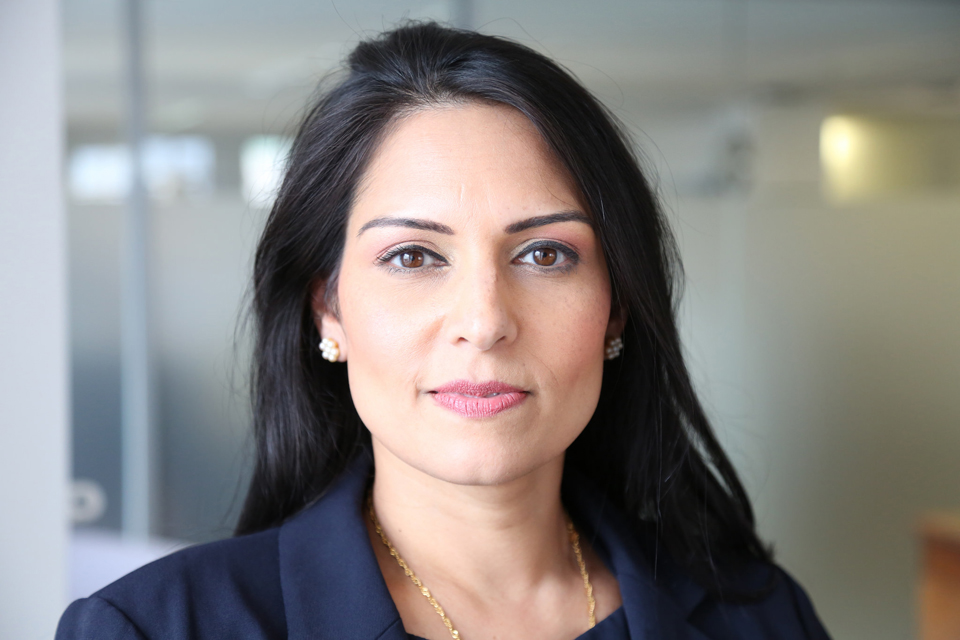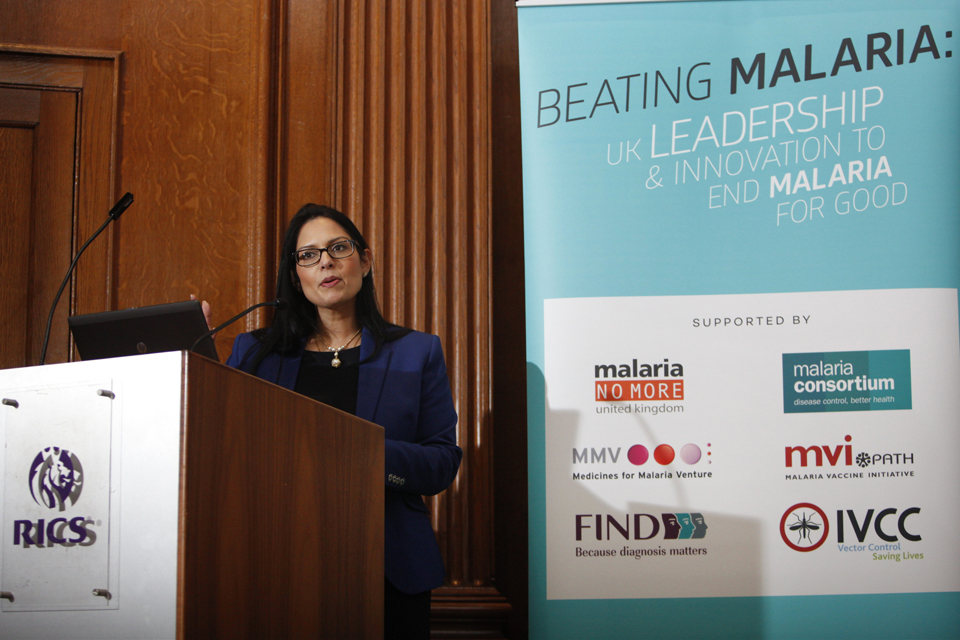Launch of World Malaria Report 2016
Speech by Development Secretary Priti Patel announcing new funding to help fight malaria.

Priti Patel. Picture: Zute Lightfoot/Malaria No More UK
Let me start by saying what a real pleasure and a privilege it is to be here this afternoon.
I’d like to thank the WHO and Malaria No More for bringing us together today– as well as thanking Jeremy (Lefroy) and the APPG on Malaria and Neglected Tropical Diseases.
We are here to celebrate the progress, that continuing progress, in the battle against malaria.

Priti Patel. Picture: Zute Lightfoot/Malaria No More UK
Globally, we know malaria death rates have dropped by nearly two-thirds since 2000, with more than 6.2 million malaria deaths having been averted.
This is an extraordinary achievement.
I always pause whenever I see those figures – the numbers of deaths that have been averted through the prevention work, through the global community coming together, through the organisations and all the global partnership working that has taken place – including by many of the people in this room.
It is phenomenal – it really is.
But of course – we’ve come so far, but you can never stand still. There is no room for complacency.
As we learn in today’s report last year there were an estimated 212 million cases of malaria worldwide – that is an extraordinary number. And on top of that there were 429,000 deaths.
And it’s not lost on me, in my first 6 months in this role, in the visits I have been on to Africa in particular – when I see children infected with malaria in hospitals, when I see parents infected, and when I see the struggle they have because of that…when I see that they are vulnerable individuals who we must give a voice to and we must stand up for.
They are the ones who are the biggest victims – the most vulnerable people: the poorest people, pregnant women, the children under 5. In fact, malaria is claiming the life of a child every 2 minutes.
And, as we know, the progress we are making when it comes to tackling malaria, is now overshadowed by the other big issue of drug resistance and insecticide resistance.
So it is imperative that the world continues to affirm its commitment to tackling malaria today, and to meeting that critical target agreed last year, of reducing the malaria burden by a further 90% by 2030.
The UK has been at the forefront of the fight against malaria for many years.
Since 2011, we have distributed 49.7 million long-lasting, insecticide-treated bed nets - saving over 800,000 lives.
In September, I announced the UK pledge of £1.1 billion to the Global Fund to Fight AIDS, TB and Malaria over the next 3 years. This will fund a further 40 million bed nets to tackle malaria.
UK funded research has supported the development of child-friendly malaria drugs - that have now been used for 300 million treatments in malaria-endemic countries.
And, of course, we will do more. I’ve said that our progress to date is threatened by drug and insecticide resistance.
We know malaria parasites that are resistant to the main drug combinations for treating malaria are now spreading across South East Asia and beyond.
So today I am announcing that the UK will invest up to £50 million in the Medicines for Malaria Venture, to support their crucial work discovering, developing and, importantly, delivering new anti-malarial drugs.
The Medicines for Malaria Venture has assembled the largest pipeline of potential anti-malarial drugs in history. And I’m proud to say DFID and the government will work with them to identify how we can develop these drugs and bring them to market.
I am also announcing today, new funding of up to £25 million, for the Innovative Vector Control Consortium (IVCC) for their work developing new insecticides.
Long lasting insecticide treated nets and indoor residual spraying of homes have had a major impact in the fight against malaria. But their increasing use has now resulted in insecticide resistance throughout Africa.
But with our support, the IVCC, who are based at the Liverpool School of Tropical Medicine, are on track to deliver 3 new active ingredients to the market by 2022.
The work that the United Kingdom is doing, the leadership role in particular the UK is playing, is, of course, part of that global effort to tackle malaria - but we must keep up the momentum.
As this report states, we urgently need to invest more when it comes to malaria control, and more investment to develop the new drugs, diagnostics and insecticides.
We need to focus our efforts on the poorest countries that are carrying the highest burden of cases - to bring down the needless deaths and sickness.
And aside from greater investment, we need to ensure that we are getting the most value out of every pound that we spend – by basing everything we do on evidence, clear and compelling evidence.
To this end we must rally behind the new Global Technical Strategy for Malaria and we look to the WHO to lead action at local, national, regional and international levels.
To conclude, we’ve seen tremendous progress. Everyone leaving this room today must not lose sight of the immense progress, the big numbers, the lives that have been saved in the poorest countries over the last 15 years.
Not just on malaria but on checking the spread of HIV/AIDS, on tackling TB, and on tackling the Neglected Tropical Diseases - which blight millions of lives around the world.
We live in this interconnected world - it is in our national interests, all our national interests, to make sure that we invest in a healthier planet.
Diseases, as we know, simply don’t respect international borders. I was recently in Sierra Leone last month, Sierra Leone speaks volumes here.
Ebola did not respect international borders – but it demonstrated how we can work together to tackle difficult diseases, in really challenging countries where the health infrastructure is under stress, and that when we come together as a global community, on an international, national and local level, we can do more when it comes to our global health security
A healthier planet leads to a more prosperous planet.
And I take the view that by investing in malaria, investing in what we can do to prevent the spread and deal with the challenges of drug and insecticide resistance – we can share the challenge and know it is in all our interests to deliver the right outcomes.
This group, the people here in the room today, the organisations - ranging from the WHO, to Malaria No More, to the Global Fund, to the APPG to all the other partners in the room today - speak hugely to that and this global, shared agenda.
Now is our opportunity to keep the momentum going and to keep the ambition very high - because that is effectively how, ladies and gentlemen, we work towards a malaria free world.
Thank you very much.